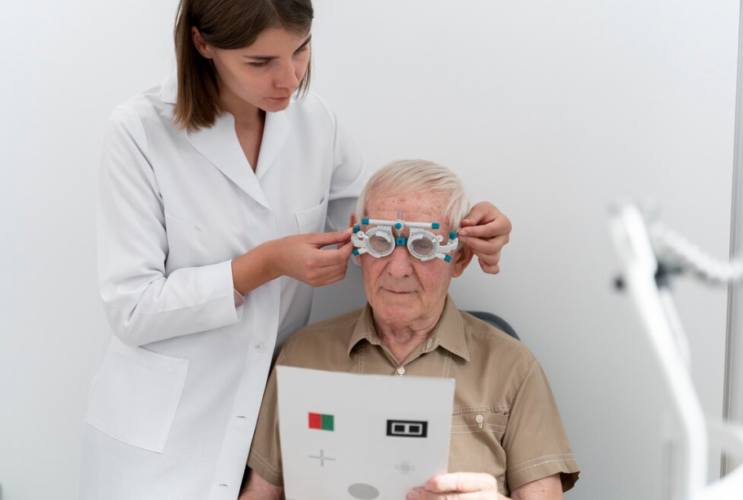Macular degeneration is a common eye condition that primarily affects older adults, leading to vision loss in the center of the visual field due to damage to the macula, a part of the retina. While it can be challenging to adjust to life with this condition, there are several strategies and lifestyle changes that can help maintain and even improve the quality of life for those affected. Here are some practical tips for living with macular degeneration.
Understanding Macular Degeneration
Macular degeneration comes in two primary forms: dry and wet. The dry form is more common and progresses slowly, while the wet form is less common but more severe and progresses rapidly. Both forms can cause significant vision impairment, making everyday tasks like reading, driving, and recognizing faces difficult. Early diagnosis and intervention are crucial in managing the progression of the disease.
Regular Medical Check-ups
Frequent visits to an eye specialist are essential for monitoring the progression of macular degeneration. Your eye doctor can recommend treatments such as anti-VEGF injections for wet macular degeneration or nutritional supplements for the dry form. These interventions can help slow down the progression of the disease and preserve vision.
Optimize Your Home Environment
Making adjustments to your home can greatly improve safety and accessibility. Here are a few modifications to consider:
- Lighting:Ensure your home is well-lit with high-intensity, glare-free lighting. Task lighting, such as lamps with adjustable arms, can be particularly helpful for reading and other close-up tasks.
- Contrast:Increase contrast in your home to make objects easier to see. Use contrasting colors for items like light switches, electrical outlets, and steps.
- Organization:Keep frequently used items in consistent, easy-to-reach places. Label items with large, bold print or tactile markers to aid identification.
- Magnification Tools:Invest in magnifying glasses, electronic magnifiers, or specialized software that enlarges text on screens to make reading easier.
Use Assistive Technology
Modern technology offers a range of tools to help people with macular degeneration maintain their independence:
- Screen Readers:Devices and apps that read text aloud can be invaluable for those with severe vision loss. Popular options include JAWS (Job Access With Speech) and NVDA (NonVisual Desktop Access).
- Voice-Activated Assistants:Smart home devices like Amazon Echo or Google Home can help with tasks such as setting reminders, checking the weather, or making phone calls, all through voice commands.
- Mobile Apps:There are numerous apps designed to assist those with vision impairments, including magnification apps, color identification tools, and GPS navigation aids.
Healthy Lifestyle Choices
Maintaining a healthy lifestyle can positively impact your overall well-being and may help slow the progression of macular degeneration:
- Diet:Eat a diet rich in fruits, vegetables, and fish. Foods high in omega-3 fatty acids, antioxidants, and vitamins C and E, such as leafy greens, nuts, and fish, are beneficial for eye health.
- Exercise:Regular physical activity can improve circulation, reduce the risk of chronic diseases, and promote overall health, which may benefit your eyes.
- Avoid Smoking:Smoking significantly increases the risk of developing macular degeneration and can accelerate its progression. Quitting smoking is one of the most important steps you can take to protect your vision.
- Manage Chronic Conditions:Conditions like hypertension, diabetes, and high cholesterol can exacerbate macular degeneration. Keep these conditions under control through medication, diet, and regular check-ups.
Emotional and Psychological Support
Living with macular degeneration can be emotionally challenging. Feelings of frustration, anxiety, and depression are common as vision declines. Seeking support is crucial:
- Counseling:Speaking with a therapist or counselor can help you cope with the emotional impact of vision loss.
- Support Groups:Joining a support group for people with vision impairments can provide a sense of community, practical advice, and emotional support.
- Family and Friends:Don’t hesitate to reach out to loved ones for assistance and support. Educate them about macular degeneration so they can better understand your needs and help you adjust.
Stay Active and Engaged
Continuing to engage in hobbies and activities you enjoy is vital for maintaining a high quality of life. Adapt activities to suit your changing vision. For example, if you enjoy reading, switch to audiobooks. If you like crafts, use magnifying tools and ensure good lighting.
Conclusion
While macular degeneration can present significant challenges, adopting a proactive approach and making strategic lifestyle adjustments can help maintain and even improve your quality of life. Regular medical care, optimizing your home environment, using assistive technology, leading a healthy lifestyle, seeking emotional support, and staying engaged in activities can all contribute to living well with macular degeneration. By focusing on these areas, you can navigate the difficulties of vision loss while continuing to enjoy a fulfilling and independent life.

